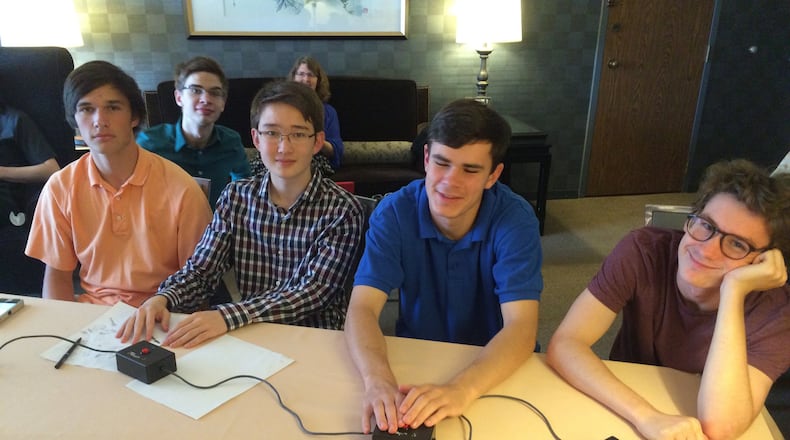What family of acids is responsible for the volatile aroma of bananas?
What function has a linear derivative but a cubic integral?
What religion competed with Zoroastrianism in ancient Persia?
If you answered esters, quadratics and Manichaeism, you might make a good quiz bowl competitor.
This past weekend all three of those queries were posed to high school students during the national tournament of high school academic bowl teams, held in Dallas.
Some 272 schools from all over the country, including 13 from Georgia, participated in the world series of quiz bowl showdowns, staged by National Academic Quiz Tournaments, or NAQT.
Gathered at the enormous Hilton Anatole in the Design District of Dallas, 1,382 high school kids raced the clock and each other to buzz in on questions about Nazi art, Russian literature and the television shows of Julia Louis-Dreyfus. Oddly, many of these braniacs were more comfortable with calculus than pop culture.
"I'm usually answering all the trash questions," said Briana Harrison, a parent-coach of the Chattahoochee High School C team, as her students waited for their next round. (Like many of the bigger schools, the Fulton County behemoth fielded multiple teams; a total of 18 teams came from Georgia schools.) "I say to them, "You don't know who the Backstreet Boys are?' and they say, 'we don't need to know that!'"
Yet these students do command a breathtaking array of information, from the works of Hegel to the Rayleigh-Jeans law governing black body radiation. They know that heliculture is the cultivation of snails and that Ganymede is the largest moon of Jupiter.
The competition is staged like team Jeopardy: two teams of four students each listen to a NAQT judge read “toss-up” questions out loud; the first team to buzz in gets a crack at answering. A correct answer nets three bonus questions.
Quiz bowlers will tell you that there is a trick to learning such a broad range of material: don’t go too deep. Whenever a painting by Manet is mentioned, it’s almost always “Luncheon on the Grass,” unless it’s “Olympia.”
Rob Hentzel, the bearded, bespectacled president of NAQT, freely admits that certain topics will always pop up in academic bowl questions. "We're always going to have Jane Austen in there," he said, early in the tournament, as teams checked their buzzers and assembled in various hotel rooms for unofficial scrimmages.
The variables will be the clues, which are scattered through the question: The most obscure come first and the give-aways come last. As the question is read, more familiar associations are revealed. If a team buzzes in early enough, it can earn a “power,” an additional five points. NAQT writers stay busy creating 15,000 to 20,000 new questions each year, with easy clues that might have been repeated many times, rarer medium clues, and brand new hard clues.
Each team has its strengths and blind-spots.
Lakeside High School, from Seattle Washington, handled the question about Manichaeism with no problem, but stumbled on an NFL tossup a few questions later. Embarrassingly, the question concerned the Seattle Seahawks.
"Man, they were good, but they don't know who their quarterback is," said Noah Hull, a Decatur High School senior.
Each team played a punishing 10 matches on Saturday. Only teams with a 6-4 record or better made it to the playoffs on Sunday, and those included Atlanta schools Westminster, Alpharetta, Johns Creek, Walton, Centennial, Northview and Chattahoochee A.
When the dust settled, Chattahochee A finished in eighth place, and Johns Creek made it to 34th. Reigning supreme was Hunter College High School, from New York City, at No. 1.
There are about 700 NAQT tournaments a year, for middle school, high school and college teams, and the national tournaments move from city to city. (This year Renfroe Middle School, also in Decatur, finished in 8th place in the middle school nationals held May 7-8 in Atlanta.)
Next year high school nationals will be in Atlanta. For those seeking more information, go to NAQT.com.
About the Author
Keep Reading
The Latest
Featured

